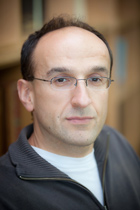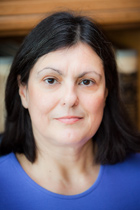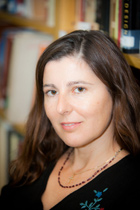

Course Outline
The Institute of Historical Research of the National Hellenic Research Foundation, one of the most important institutions for the study of Greek History (ancient, Byzantine and modern) at international level, is pleased to announce the organization of its first Summer School on Greek Palaeography and Byzantine Epigraphy with the kind collaboration of the Monastery of Saint John the Theologian in Patmos, the island of the Revelation.
The one-week intensive Summer School is an introductory course to Greek Palaeography and Byzantine Epigraphy aiming to provide students with basic skills that will enable them to approach manuscripts and written inscriptions.
A unique feature of this Summer School is that students will be given the opportunity to learn and practice within the Monastery of Saint John, which is now home to more than 1200 manuscripts and a large number of icons and monumental paintings with inscriptions dating from the 12th to the 16th century.
The Summer School will be held from July 4 to July 9, 2016. The instructors are researchers of the National Hellenic Research Foundation and in particular of the Institute of Historical Research with extensive experience in the study of Greek Palaeography and Byzantine Epigraphy. The lectures will take place at the Patmias Ecclesiastical School, and the practical exercise sessions inside the monastery.
The course of Palaeography will be taught in Italian and English, whereas the course of Byzantine Epigraphy in English. Adequate knowledge of Ancient Greek is a prerequisite for participation.
The school is open to PhD candidates, postgraduate, graduate students and pre-graduate students in their final year of Classics, Philology, History, Theology, Byzantine and Medieval Studies.
The number of students is limited to 20. They will be selected by a Scientific Committee following a thorough assessment of the application and the CV of the candidates.
All students will receive a certificate of participation.
The Summer School has been implemented with the kind contribution of ALPHA BANK
Programme
Monday, July 4 |
|
10.00- 13.00 |
|
13.00- 13.30 |
Light Lunch |
17.00- 20.00 |
Practical exercise on manuscripts and inscriptions * |
Tuesday, July 5 |
|
10.00- 13.00 |
|
13.00- 13.30 |
Light Lunch |
17.00- 20.00 |
Practical exercise on manuscripts and inscriptions * |
Wednesday, July 6 |
|
10.00- 13.00 |
|
13.00- 13.30 |
Light Lunch |
17.00- 20.00 |
Practical exercise on manuscripts and inscriptions * |
Thursday, July 7 |
|
10.00- 13.00 |
|
13.00- 13.30 |
Light Lunch |
17.00- 20.00 |
Practical exercise on manuscripts and inscriptions * |
Friday, July 8 |
|
10.00- 13.00 |
|
13.00- 13.30 |
Light Lunch |
17.00- 20.00 |
Practical exercise on manuscripts and inscriptions * |
Saturday, July 9 |
|
09.00- 11.00 |
|
12.00 – 20.00 |
Daily excursion in the island of Patmos |
*Afternoon Practical Exercises (17.00 - 20.00)
The practical exercise on manuscripts and inscriptions will take place at the Library, Museum, Katholikon (church) and chapels of the monastery of Saint John the Theologian, as well as the Cave of the Revelation, under the guidance of Zisis Melissakis and Eugenia Drakopoulou.
The timetable will be finalized in accordance with the monastic services and the monks’ schedule.
The Summer School has been implemented with the kind contribution of ALPHA BANK
Application Procedure
The school is open to PhD candidates, postgraduate, graduate and pre-graduate students in their final year of Classics, Philology, History, Theology, Byzantine and Medieval Studies.
The course of Palaeography will be taught in Italian and English, whereas the course of Byzantine Epigraphy in English. Adequate knowledge of Ancient Greek is a prerequisite for participation.
The number of students is limited to 20. They will be selected by a Scientific Committee following a thorough assessment of the application and the CV of the candidates.
The final deadline for applying is: May 11, 2016 (00.00 EET)
Candidates are invited to submit the online application form
Applicants will be informed of the selection results by e-mail not later than May 16, 2016. Along with the confirmation, they will also receive further information to complete the registration process.
The Summer School has been implemented with the kind contribution of ALPHA BANK
Instructors

Dr. Eugenia Drakopoulou
Dr. Eugenia Drakopoulou graduated from the School of Philosophy of the University of Athens. She received her MA from EHESS in Paris and her PhD in Byzantine Epigraphy from the University of Athens. She is Research Director at the Institute of Historical Research of the National Hellenic Research Foundation. She is also Professor of History of Art at the Open University of Greece. She has published several books and articles on byzantine and post-byzantine art and epigraphy. Her research focuses on Byzantine and post-byzantine art and archaeology, Byzantine and post-byzantine epigraphy, Cultural history of the Hellenic world from 15th to 19th century.
Full CV http://www.eie.gr/nhrf/institutes/inr/cvs/cv-drakopoulou-en.pdf

Dr. Zisis Melissakis
Dr. Zisis Melissakis is a Senior Researcher at the Institute of Historical Research (Department of Byzantine Research) of National Hellenic Research Foundation. His main research interests are Greek Palaeography and Codicology (cataloguing and study of manuscripts, codicological research, history of libraries) and History of the Greek printed book (15th-19th c.). He is the author of three monographs and numerous articles. His current research focuses on Mount Athos’ and other monastic libraries. At present he leads a project on the cataloguing the Greek manuscripts of St. John monastery in Patmos.
Full CV http://www.eie.gr/nhrf/institutes/ibr/cvs/cv-melissakis-en.pdf

Maria Gerolymatou
Maria Gerolymatou is Research Director at the Institute for Historical Research of the National Hellenic Research Foundation. She graduated from the Department of History and Archaeology of the University of Athens. She holds a PhD in Byzantine History from the University Paris I-Panthéon-Sorbonne (Docteur en Histoire). She is the author of a book on Byzantine Trade during the middle byzantine period (9th-12th centuries) and editor of the Byzantine Patriarchal Documents of the Patmos Monastery. She is the author of several articles on Byzantine Economic and Social History, as well as on Patmos and the south eastern Aegean.
Full CV http://www.eie.gr/nhrf/institutes/ibr/cvs/cv-gerolymatou-en.pdf

Harikleia Brekoulaki
Harikleia Brekoulaki is a Doctor in Archaeology and holds a researcher position at the Institute of Historical Research, Department of Greek and Roman Antiquity (The National Hellenic Research Foundation). Her work mainly focuses on issues related to Greek painting, with a particular interest in the technological aspects of ancient polychromy. Her publications include the books L’esperienza del colore nella pittura funeraria dell’Italia preromana V-III secolo a.C. (2001), La peinture funéraire de Macédoine. Emplois et fonctions de la couleur, IV-IIème s. av. J.-C. (2006) and Mycenaean Painting in Context. New Discoveries, Old Finds Reconsidered (co-editors J. Davis and Sh. Stocker), 2016.
Full CV http://www.eie.gr/nhrf/institutes/igra/cvs/cv-brecoulaki-en.pdf
The Summer School has been implemented with the kind contribution of ALPHA BANK
Venue
The Summer School will be held in the island of Patmos. Patmos belongs to the Dodecanese complex in the Aegean sea. It is the island where it is said that Saint John wrote the book of the “Apocalypse”. Thus, it is known as the island of the Apocalypse.
The capital of the island is Chora whereas Skala is the port. Other big communities in the island are Grikos and Kampos.
UNESCO declared in 1999 the island’s historic center (Chora), the Monastery of Saint John the Theologian and the Cave of the Apocalypse as World Heritage Sites.
The lectures will take place in the Patmias Ecclesiastical School whereas the practical exercise sessions in the Library and Museum of the Monastery of St John the Theologian.
The Monastery of Saint John is built on top of the mountain and dominates not only the Chora of Patmos but the entire island. The key person exclusively responsible for the foundation of the Monastery and, to a certain degree, for the dynamic development of the monastery into a financially independent small state was a monk from Asia Minor, Christodoulos, who came from the region of Nicaea of Bithynia. He was a perceptive, educated, well-travelled, persistent and efficient monk, a leading figure having close and continuous contacts with the imperial and circles of the Patriarchate of Constantinople. Christodoulos had a practical mind and diplomatic skills too. Thanks to the imperial foundational chrysobull, Christodoulos secured for the island of Patmos administrative autonomy, imperial protection as well as the Patriarchate’s protection, the mandate for the cultivation of a high level education, wealth through the monastery’s dependencies and ships for trading purposes. He has also built the castle for the monastery’ s protection.
For a digital representation of the monastery you can visit the site:
https://www.google.com/culturalinstitute/u/0/collection/patmos-monastery?projectId=art-project
For more information visit the website of the Monastery: http://www.patmosmonastery.gr/
Patmias Ecclesiastical School was founded in 1713 by the Patmian Makarios Kalogeras. The school was originally housed in the Holy Cave of the Apocalypse, and it was transformed accordingly in order to include classrooms and dormitories for the students. Today, few sections from the first School (the old Patmias) are saved. The courses are mainly taught in the “New Patmias” building.
How to get there
By Sea
Patmos is connected by ferry with the port of Piraeus (journey approximately of 8 hours) and with the islands of the Dodecanese (Leros, Kalymnos, Kos, Rhodes), the Cyclades (Syros, Mykonos) and the Northern Aegean islands (Samos, Ikaria, Chios, Lesvos and Limnos), as well as with Northern Greece (Kavala).
For further information, please consult www.openseas.gr
Or the shipping lines:
www.bluestarferries.gr/site/content.asp?sel=&loc=2
www.hellenicseaways.gr/
During the summer months, high-speed vessels connect Patmos to the islands of Samos, Ikaria, Leros, Kalymnos, Kos and Rhodes, all of which have airports.
For further information, please contact: www.12ne.gr/en/index.asp
Indicative timetable (to be checked before booking)
|
FROM |
TO |
DEPARTURE |
ARRIVAL |
Saturday, July 2nd |
Kos |
Patmos |
11.00 |
13.25 |
|
Kos |
Patmos |
13.30 |
15.50 |
|
Samos (Pythagorio) |
Patmos |
08.30 |
10.05 |
Sunday, July 3rd |
Kos |
Patmos |
11.00 |
13.25 |
|
Kos |
Patmos |
13.30 |
15.50 |
|
Samos (Pythagorio) |
Patmos |
08.30 |
11.00 |
Sunday, July 10th |
Patmos |
Kos |
11.00 |
13.20 |
|
Patmos |
Kos |
13.30 |
15.55 |
|
Patmos |
Samos (Pythagorio) |
15.55 |
18.30 |
By air
Although Patmos does not possess an airport, it is connected by boat on an almost daily basis with several islands. The closest international airport is in Samos in the complex of Northearn Aegean islands (departure of boats from Pythagorio). The second closest airport is located in Kos.
If you need any assistance for your travel arrangement, you could contact us by email ([email protected]).
The Summer School has been implemented with the kind contribution of ALPHA BANK
Accomodation
We have made a prior arrangement with the hotels below:
Hotel |
Single Room |
Double Room |
66 Euros |
88 Euros |
|
47 Euros |
58 Euros |
|
45 Euros |
60 Euros |
|
42 Euros |
53 Euros |
|
40 Euros |
|
|
60 Euros |
60 Euros |
If you are interested to lodge in one of the proposed hotels and especially if you wish to share a double room with another participant it is advised to contact us by email in order to arrange the booking for you.
Please bear in mind that the departure of the bus to the place of lectures is only from Skala.
The Summer School has been implemented with the kind contribution of ALPHA BANK
Fees
There is a participation fee of 380 Euros. Should the candidate be accepted, the amount is required to be paid the latest by May 20, 2016. The fee includes Summer School courses, course material, transportation within the island, a welcome dinner on Sunday, July 3 and a light lunch each day. Students are individually responsible for their transportation, accommodation and living expenses on Patmos island.
Cancellation/fee policy
The Summer School has been implemented with the kind contribution of ALPHA BANK
Contact
For further information, please contact us by email at [email protected], or by phone (Mrs V.Kollia, +30 210 7273767)
The Summer School has been implemented with the kind contribution of ALPHA BANK
Photos
The Summer School has been implemented with the kind contribution of ALPHA BANK
Terms of Use | Privacy Policy | Cookies Policy | © National Hellenic Research Foundation